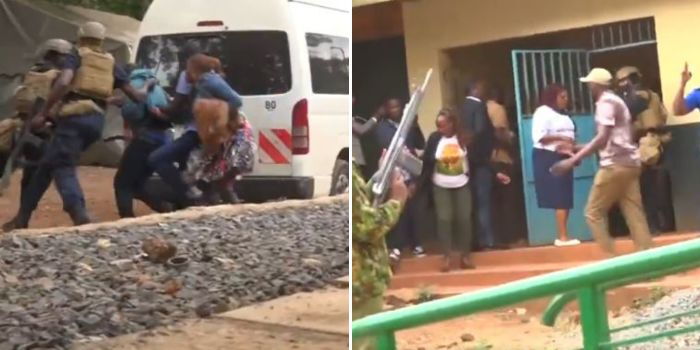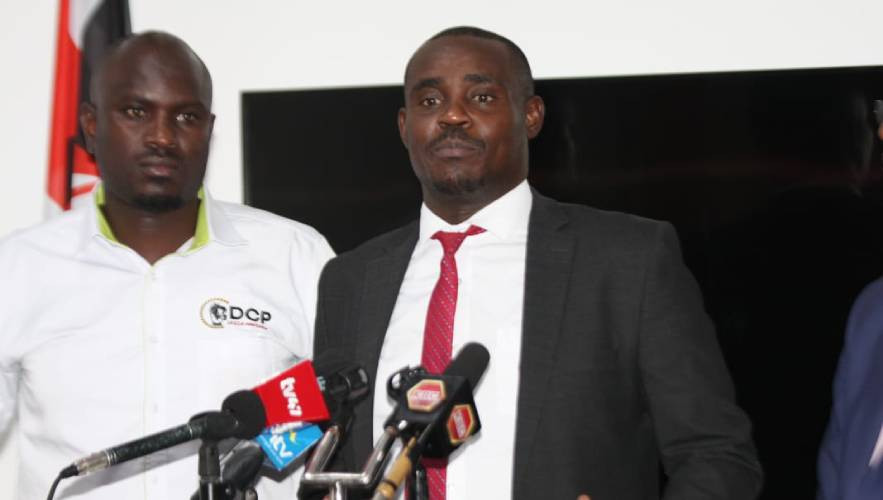Anti Terror Police Unit: What it takes to join, special training & operations | Pulselive Kenya
Operatives from the elite Anti-Terrorism Police Unit were in action of Friday, dramatically arresting Democracy for the Citizens Party (DCP) youth leaders Peter Kinyanjui alias Kawanjiru and Wanjiku Thiga.
Kawanjiru was seized at Ruiru law courts with the operatives pouncing on Wanjiku at Kikuyu police station in a similar fashion.
Several shots were fired during the two separate incidents which were captured in camera with the operatives whisking the suspects away in record time as relatives unsuccessfully tried to thwart their re-arrest.
)
Anti Terror Police Unit: What it takes to join, special training & operations
The well-coordinated operation saw focus shift to the operations of the well-equipped and trained squad that is known for their efficiency and credited with the decline in terror activities in the country.
Here is all you need to know about the elite squad, its operations and achievements.
Domiciled within the Directorate of Criminal Investigations, the Anti-Terrorism Police Unit is headed by the Director ATPU.
Its primary mandate is to detect, disrupt and interdict terrorist activities within the country while also investigating all terrorism related cases.
The team also creates profile of suspected terrorists, gathers and shares intelligence with other security agencies and
Their presence is often felt when terrorists strike when they move in to take on the terrorists in coordination with other security agencies, taking control and securing evidence at the scene.
Working in collaboration with other agencies, the team has been behind the decline of terror-related activities in the country.
ATPU was formed on February 10, 2003 in response to the growing threat of terrorism and in the wake of devastating attacks in the country.
Among the attacks preceding its formation was the bombing of the U.S embassy in Nairobi which claimed more than 220 lives, 2002 Kikambala Hotel bombing and Arkia Airlines missile attack in Mombasa.
Its formation was also informed by the emergence of terror cells in the region professing allegiance to terror groups such as ISIS, Al-Queda, Al-Shabaab among others.
Recruitment to join is an elaborate process by design, one which is meant to only have the best with interested Kenyans having to go through the through the National Police Service recruitment as a first step.
Thereafter, the Directorate of Criminal Investigations where the ATPU is domiciled recruits officers internally from within the National Police Service including those who will end up in this elite squad.
To stand a chance, one must have certain academic qualifications, possess specific skills including demonstrated professional maturity, integrity and attention to detail.
Other requirements include the ability to apply logical reasoning, maintain objectivity and ability to independently analyse complex situations.
The personnel are spread out across four Regional offices (Sub-Units) namely; Nairobi Sub-Unit, North Eastern Sub-Unit, Coast Sub-Unit and Western Sub-Unit and provide coverage across the whole country.
Officers joining the unit are carefully selected and undergo rigorous training for tactical operations and investigations to dismantle terror networks, profile and arrest suspects.
)
Anti Terror Police Unit: What it takes to join, special training & operations
They also handle military-grade equipment and hardware necessary in their line of duty and respond swiftly to active high risk terror scenes.
Those who meet the cut undergo intense training that requires one to be mentally and physically fit.
Training includes land, air and water combat, close quarter combat, advanced Special Operations technique and interagency operations and firing practice complete with advanced marksmanship training to be able to shoot targets with accuracy, live fire maneuvres, urban operations and combat.
)
)
)









